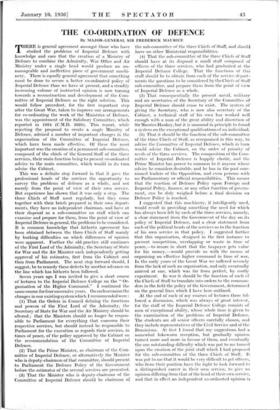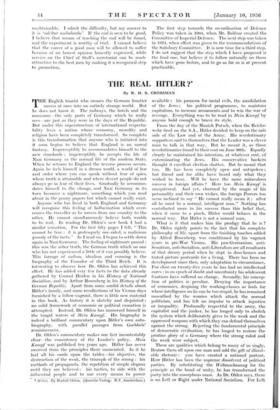THE CO-ORDINATION OF DEFENCE
By MAJOR-GENERAL SIR FREDERICK MAURICE
THERE is general agreement amongst those who have studied the problems of Imperial Defence with knowledge and care that the creation of a Ministry of Defence to combine the Admiralty, War Office and Air Ministry under a single head would produce an un- manageable and ineffective piece of government machi: nery. There is equally general agreement that something must be done to secure a better eo'-ordinated policy of Imperial Defence than we have at present, and a steadily increasing volume of instructed opinion is now turning towards a reconstruction and development of the Com- mittee of Imperial Defence as the right solution. This would follow precedent, for the first important step after the Great War, taken to improve our arrangements for co-ordinating the work of the Ministries of Defence, was the appointment of the Salisbury Committee, which reported in 1924 (C.M.D. 2029). This report, while rejecting the proposal to create a single Ministry of Defence, advised a number of important changes in the organisation of the Committee of Imperial Defence, which have been made effective. Of these the most important was the creation of a permanent sub-committee, composed of the chiefs of the General Staff of the three services, their main function being to present co-ordinated advice to the main committee, which would in its turn advise the Cabinet.
This was a definite step forward in that it gave the professional heads of the services the opportunity to survey the _problems of defence as a whole, and not merely from the point of view of their own service. But experience has shown that it was only a step. The three Chiefs of Staff meet regularly, but they come together with their briefs prepared in their own depart- ments, they have no independent chairman, and have at their disposal as a sub-committee no staff which can examine and prepare for them, from the point of view of Imperial Defence in general, the problems to be considered. It is common knowledge that hitherto agreement has been obtained, between the three Chiefs of Staff mainly by burking difficulties on which differences of opinion were apparent. Further the old practice still continues of the First Lord of the Admiralty, the Secretary of State for War and the Air Minister each independently getting approval of his estimates, first from the Cabinet and then from Parliament; The next step forward should, I suggest, be to remedy these defects by another advance on the line which has hitherto been followed.
- Seven years ago I was invited to give a short course of lectures to the Imperial Defence College on the " Or- ganisation of the Higher Command." I continued the same course for four successive years. On each occasion the changes in our existing system which I recommended were : (1) That the Orders in Council defining the functions and powers of the First Lord of the Admiralty, the Secretary of State for War and the Air Ministry should be -altered ; that the Ministers should no longer be respon- sible to Parliament for everything -that concerns their respective services, but should- instead be responsible to Parliament for the execution as regards their services, in times of peace, of the policy approved by the Cabinet on the recommendation of the Committee of Imperial Defence. • - (2) That the Prime Minister, as chairman of the Com- mittee of Imperial Defence, or alternatively the Minister who is deputy-chairman of that committee, should present to Parliament the Defence Policy of the Government before the estimates of the several services are presented. (3) That the Minister who is deputy-chairman of the Committee of Imperial ,Defence should be chairman of the sub-committee of the three Chiefs of Staff, and should have no other Ministerial responsibilities.
(4) That the sub-committee of the three Chiefs of Staff should have at its disposal a small staff composed of officers of the three services, who had graduated at the Imperial Defence College. That the functions of this staff should be to obtain from each of the service depart- ments the questions to be considered by the Chiefs of Staff sub-committee, and prepare them from the point of view of Imperial Defence as a whole.
(5) That consequentially the present naval, military and air secretaries of the Secretary of the Committee of Imperial Defence should cease to exist. The system of giving the Secretary, who is now also secretary of the Cabinet, a technical staff of his own has worked well enough with a man of the great ability and discretion of Sir MauriceHankey, but it is unsound in principle to found a system on the exceptional qualifications of an individual.
(6) That it should be the function of the sub-committee of the three Chiefs of Staff, as reorganised in this way, to advise the Committee of Imperial Defence, which in turn would advise the Cabinet, on the order of priority of -needs of the three services. The composition of the Com- mittee of Imperial Defence is happily elastic, and the Prime Minister has power to summon to it anyone whose advice he considers desirable, and he has in the past sum- moned leaders of the Opposition, and even persons with no Parliamentary or official responsibilities. This means that the reaction of Defence Policy upon Foreign and Imperial Policy, finance, or any other function of govern.. ment, can be duly weighed before a final decision on Defence Policy is reached.
I suggested that this machinery, if intelligently used, would result in providing something the need for which has always been felt by each of the three services, namely, a clear statement from the Government of the day on its policy of Imperial Defence, and a clear statement from each of the political heads of the services as to the function of his own service in that policy. I suggested further that this organisation, designed in the first instance to prevent competition, overlapping or waste in time of peace,—to insure in short that the taxpayer gets value for his money,—would provide us with the means of organising an- effective higher command in time of war, In the early years of the Great War we suffered severely from the lack of such an organisation, and only eventually arrived at one, which was far from perfect, by costly experiment. In war it should be the function of each cf the Chiefs of Staff to translate into orders to the comman- ders in the field the policy of the Government, determined on the general lines which I have here outlined.
- At the end of each of my courses of lectures there fol- :lowed a discussion, which was always of great interest, for the staff of the Imperial Defence College consists of • men of exceptional ability, whose whole time is given to the examination of the problems of Imperial Defence. The students are all senior officers carefully chosen, and they include representatives of the Civil Service and of the Dominions. At first I found that my suggestions had a somewhat- lukewarm, reception, but gradually opinion turned more and more in favour of them, and eventually the one outstanding difficulty which was put to me turned upon the creation of the joint staff which I had proposed for the sub-committee of the three Chiefs of Staff. It was put to me that it would he very difficult to get officers, who from their position have the right to look forward to a. distinguished -career in their own service, to give an opinion differing from that of the head of their own service, and that in effect an independent co-ordinated opinion is unobtainable. I admit the difficulty, but my answer to it is ‘solvitur ambulando.' If the end is seen to be good, I believe that means of reaching the end will be found, and the experiment is worthy of trial. I cannot believe that the career of a good man will be allowed to suffer because of an honest opinion honestly expressed, while service on the Chief of Staff's secretariat can be made attractive to the best men by making it a recognised step to promotion. The first step towards the co-ordination of Defence Policy was taken in 1904, when Mr. Balfour created the Committee of Imperial Defence. The next step was taken in 1924, when effect was given to the recommendations of the Salisbury Committee. It is now time for a third step. I do not suggest that the step which I have proposed is the final one, but believe it to follow naturally on those which have gone before, and to go as far as is at present practicable.











































 Previous page
Previous page